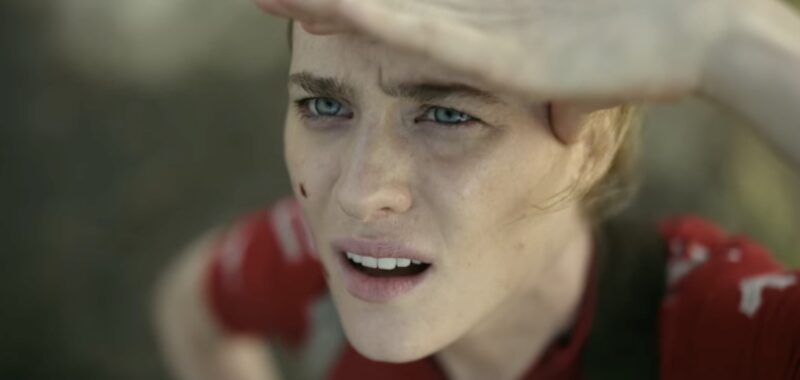Station Eleven, HBO’s 2021 adaptation of Emily St. John Mandel’s 2014 novel, is a near-perfect singular season of television. I was so relieved when it dodged the trap of extending a limited series into an unnecessary sequel, even though creator Patrick Somerville’s post-apocalyptic world was so richly realized that he and the writers could certainly have envisioned new adventures for Kirsten Raymonde and the Traveling Symphony after they stepped back onto the Wheel at the end of those ten episodes.
While Mandel had initially decided against consulting on Station Eleven, she revealed in a 2022 interview with The New Yorker that she would be collaborating with Somerville on adapting her subsequent two novels. With the book having marked its tenth anniversary this year, Mandel gave a new interview to Slate about how each novel feels like a time capsule; she candidly admits how she might have written each differently today. That, combined with tweets between Mandel and Somerville when the adaptation news was announced, gives a general sense of how these three seemingly incongruous genres—post-apocalypse, literary crime fiction, time travel sci-fi—could fit together. The answer, or at least a starting point? Parallel universes.
The ESJM Extended Universe
First, the books themselves. Station Eleven was published in 2014 and obviously took on new significance in 2020 during the start of the covid-19 pandemic, during which time the TV adaptation was already in production. That same year saw the publication of The Glass Hotel, which despite the extra anticipation of a sequel was instead likened to her earlier crime thrillers, centering on investor Jonathan Alkaitis’ Ponzi scheme and its aftershocks. However, it quickly became clear when reading that it was actually an alternate universe, however subtle, to Station Eleven. Most noticeable was an offhand mention of the dreaded Georgia Flu being contained (instead of the 99% mortality rate in the other world), plus the inclusion or expansion of characters Miranda Carroll and Leon Prevant, even if the novel’s central characters (Alkaitis and his wife Vincent) were all new to readers. Sea of Tranquility followed in 2022, clearly broadcasting its connections; Mandel’s most explicitly sci-fi novel, it deals in time travel up and down the timestream of The Glass Hotel, as well as raising questions about whether we live in a simulation—as the New Yorker profile pointed out, a fun thought experiment for Mandel in not having to completely commit to a certain outcome.
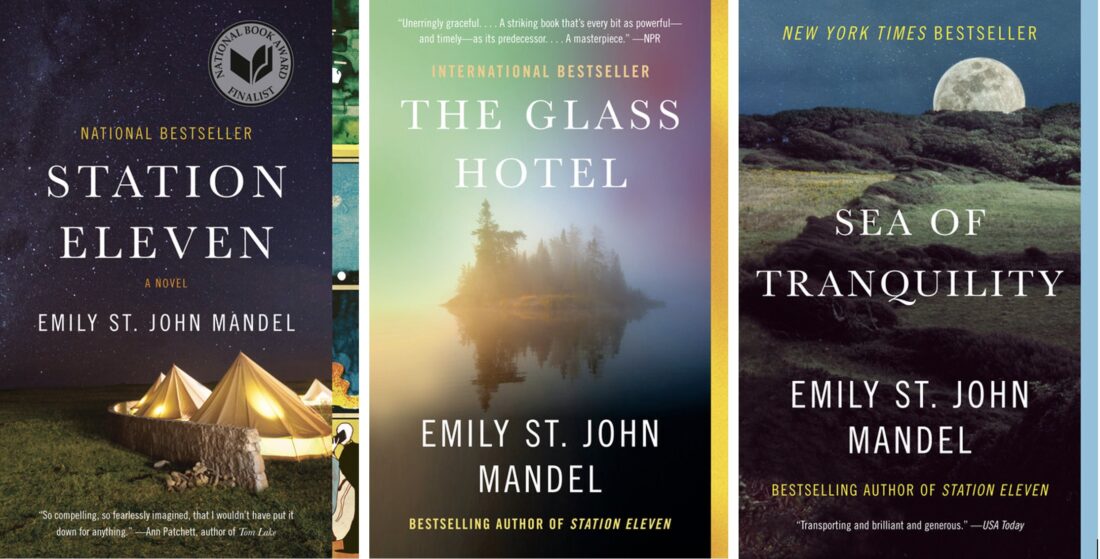
“The books were in parallel universes,” Mandel told a reader via Twitter in 2022. “But if we get to do screen adaptations, they’ll all be in the Station Eleven universe.” To understand what that could mean, we must examine a sort of television narrative family tree whose limbs stretch from 2014 to 2023.
The Lindelof/Somerville TV Universe
Damon Lindelof and Patrick Somerville worked together on The Leftovers, then branched off—Lindelof to adapt Alan Moore and Dave Gibbons’ Watchmen and later introduce us to the divinely bonkers reality of Mrs. Davis, Somerville to adapt Station Eleven. Three of these four shows are perfect miniseries if you’re examining the generational fallout of a superhero-turned-supervillain forcibly attaining world peace via worldwide trauma, or if you’re pondering whether humans innately possess goodness or if they’ll only love thy neighbor via the gamification of an app. However, if you’re going to extend the story and world of Station Eleven in multiple directions, your definitive blueprint is The Leftovers, in which two percent of the world’s population simply disappears, and the rest of us are irrevocably changed by that absence.
So, consider this your spoiler warning for The Leftovers, Watchmen, and Mrs. Davis. First things first, the question of balancing not only parallel universes, but those that mirror one another.
Alternate Universes and Inverse Realities
Whereas The Glass Hotel contained mostly subtle nods to the world of Station Eleven, with characters like Miranda’s boss Leon Prevant (Chike Johnson) playing a more prominent role—not to mention Miranda herself (Danielle Deadwyler) elevated to CEO!—the TV version would likely conjure up the AU versions of many of Station Eleven‘s beloved characters. Imagine Sarah a.k.a. The Conductor (Lori Petty) and Gil (David Cross) in an artistically unfulfilling marriage grasping for the collaboration that will bring them back together. Or Jeevan (Himesh Patel) returning to the book’s source material by exploring an aimless career as a paparazzo—which, ironically, lines up with the actor’s current role on the IP satire The Franchise. There he could cross paths with a young adult Kirsten (which would match with a now-deleted tweet from Somerville about “Matilda [actress Lawler] all grown up”), who might go the child star route and eventually flame out if she gets caught in all the Hollywood bullshit instead of the post-apocalyptic purity of performance granted by the Traveling Symphony. And of course, we’d want to see Mackenzie Davis back as adult Kirsten, but a radically different version of the knife-wielding artist we met in Year 20.
Somerville adding “Tyler too” also implies that we could see more of Arthur’s son (Daniel Zovatto), though one wonders if he’ll manage to create a cult even without the world ending (probably). One plot thread I’m pretty sure we’d get to see is Dr. Terry a.k.a. St. Deborah (Tara Nicodemo) again, but this time she wouldn’t be delivering miracle babies on the Winter Solstice in Year Zero, she’d be losing her medical license after participating in Alkaitis’ Ponzi scheme. In Station Eleven, not being at the hospital saved her from getting infected with the Flu; in The Glass Hotel, what she would be losing is post-apocalyptic sainthood.
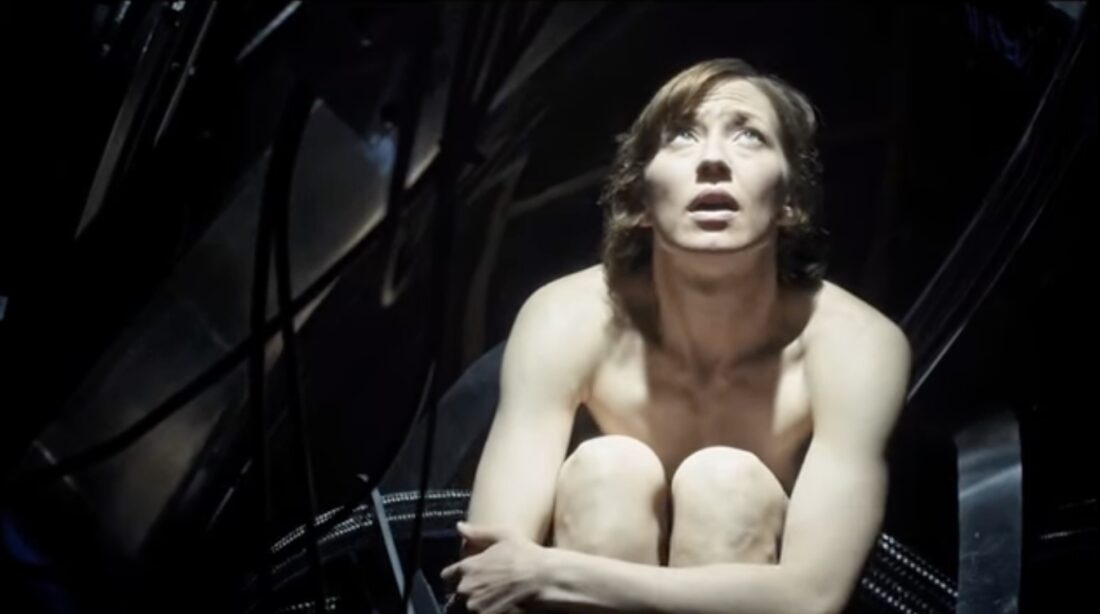
But what I’m most excited to see is how they would handle the Flu only killing one percent of the population, in an inverse to the original canon. The Leftovers series finale “The Book of Nora” ends with exactly this, as Nora Durst (Carrie Coon) climbs into an experimental device meant to transport her to wherever her husband and children vanished on the day of the Sudden Departure. What she discovers is harrowing: “Over here, we lost some of them; but over there, they lost all of us.” Ninety-eight percent of the world disappeared in that other reality, yet seven years later the survivors had rebuilt as well as they could; ironically, they had emotionally moved on better than the world that lost two percent, perhaps because a loss of such magnitude demanded nothing less. The Traveling Symphony’s mantra, quoting Star Trek: Survival is insufficient.
The creative decision to have Nora tell the entire story to former love Kevin (Justin Theroux), instead of showing any of her incredible journey, leaves it up to the viewers to believe her or not. As the character who arguably suffered the worst from the Sudden Departure—and who was humbled to see her family move on beyond her loss, still having each other—hers is a voice we trust for the whole series, so it makes sense that we extend that trust to the series’ final moments.
However, that doesn’t seem likely to be the case with The Glass Hotel; you can’t have an entire season-long monologue, not even from someone like Miranda who we’ve grown to love, or at least a version of her. In order to fully inhabit this reality where humanity dodged a pandemic bullet, we have to see every granular detail of the worldbuilding, and clock every minute (and massive) difference.
Meta Worldbuilding
Watchmen retells its own history through artifacts. Adrian Veidt a.k.a. Ozymandias’ (Jeremy Irons) little vanity play “The Watchmaker’s Son” says as much about the history and impact of Dr. Manhattan as does the glowing blue dildo that Laurie Blake (Jean Smart) totes around. The Tulsa police force’s masks and costumes are a response to the White Night massacre by the Seventh Kavalry, but it’s not until Angela Abar a.k.a. Sister Night (Regina King) ingests the Nostalgia pills that she truly understands the generations of trauma wrought upon Tulsa. Talk about time capsules!
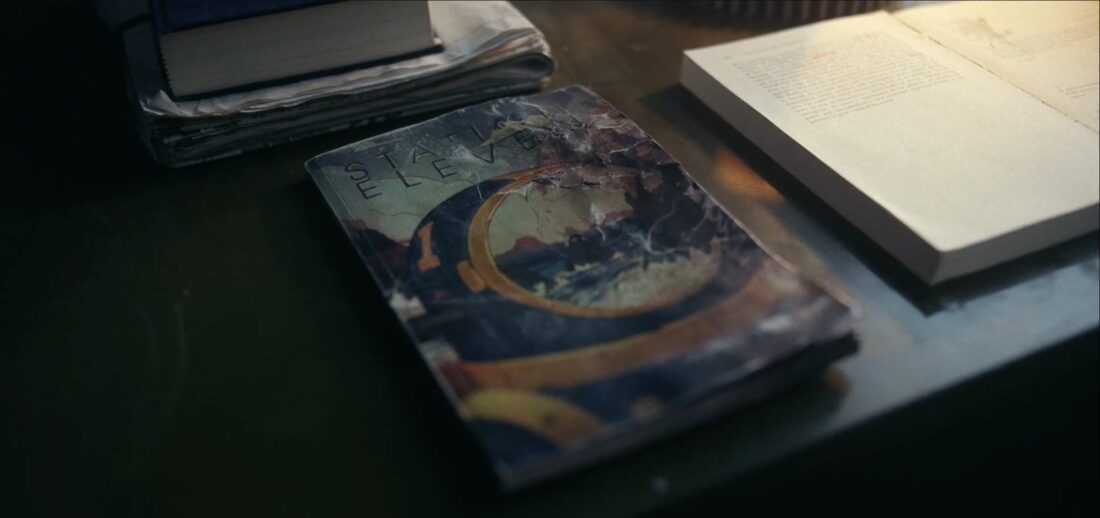
Somerville took a similar approach with depicting how Station Eleven, Miranda Carroll’s self-published graphic novel, becomes a foundational text for young Kirsten and Tyler in the early years of rebuilding and forging a new way forward. Even more fascinating was that they clearly had competing headcanons about what different characters and plotlines meant, with him creating his Undersea cult around it and her applying it to her all-or-nothing approach to family or foes on the Wheel. And obviously there’s the Museum of Civilization, which Clark Thompson (David Wilmot) fills with so much obsolete technology and cultural markers that he doesn’t recognize that he becomes one of the artifacts himself.
But neither of these archives will exist in The Glass Hotel. Do the showrunners highlight their absence, or do they find new objects and spaces to highlight? What we do already have in the book source material are the home videos made by Paul Smith, who composes music to turn them into multimedia works while he and half-sister Vincent work at the eponymous glass hotel in the fictional Canadian village of Caiette. Vincent, who features prominently in them, does not appreciate the attention, especially after she marries Jonathan Alkaitis and then is part of his Ponzi scheme downfall.
So it seems a sure bet that the TV series would feature these videos—especially because one of those videos captures a moment of time travel in Sea of Tranquility. In Vincent’s childhood video, a forest scene briefly transforms into what appears to be a train station, with the familiar sound of a violin and the decidedly unfamiliar sound of some futuristic transportation. This is bizarre enough on its own, but especially baffling that three people experience the same moment in 1912, 2020, and 2203.
Further, Sea of Tranquility looks to exist in a post-covid world, as the time traveler accidentally makes a mention of a coming pandemic to a partygoer in January 2020; perhaps that means we’ll see masking culture and other covid signifiers woven into society as it jumps forward through the centuries, especially since the 23nd-century setting of that novel has a lunar colony dealing with its own pandemic.
I foresee a lot of familiar motifs anchoring the two adaptations—lots of repetition and inversion. After all, everything is cyclical.
Dream Casting the Future
There were truly no small parts on Station Eleven, with guest actors like David Cross making an impact even in just one episode or two, and a mix of established names and unknowns in the core ensemble. I anticipate similar casting choices for the new characters, but here are some general vibes based on my own reading.
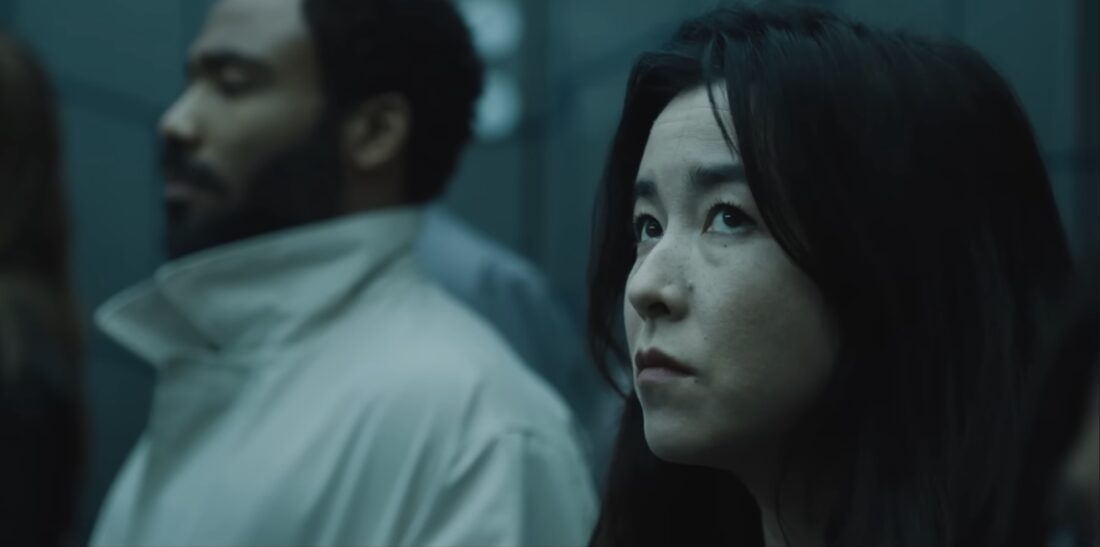
Vincent Alkaitis (née Smith) being described as chameleon-like calls for someone like Maya Erskine, who demonstrated in Mr. & Mrs. Smith her ability to play someone with the skills to melt into the role of anonymous newlywed and killer spy while still falling prey to something as tedious as feelings. Or Ali Ahn, whose extremely competent and snarky CIA agent on The Diplomat nonetheless struggles to compartmentalize her love life and her work life, both equally dangerous. I’m feeling Dean Norris (Breaking Bad) as Ponzi-scheming Jonathan Alkaitis, as he could play heartless equally as well as the vulnerability of experiencing his “counter-lives” and regret in prison. As for Vincent’s half-brother Paul, I’m split on a number of male actors, from Lukas Gage to Jacob Tremblay to Alex Wolff.
Looking to the future, Lupin star Omar Sy could shoulder time traveler Gaspery-Jacques Roberts’ mindfuck-y assignment in Sea of Tranquility with flair and tragic flaw. And with lunar colony author Olive Llewellyn being a stand-in for Emily St. John Mandel, my mind goes to Hacks’ Hannah Einbinder or Severance’s Britt Lower, both of whom could deliver the bemused humor of this author witnessing life imitate art while on book tour—both on the Moon and Earth—for her pandemic novel.
Time Travel and Simulation Hypothesis
As Gaspery-Jacques investigates the strange spaceport moment experienced by strangers 300 years apart, one of his developing theories is that perhaps it’s a glitch in the system—that perhaps we are living in a simulation, one that is falling apart. It’s a delightful narrative curveball after following Mandel to the end of the world (in macro) and the end of the world (in micro) for two books; in the New Yorker profile she cackles when the subject is brought up, but then later simply says, “I like to experiment.”
So let her experiment! I want to see Sea of Tranquility take this concept way further than Mrs. Davis’ Holy Grail sneaker commercial-as-beacon, far beyond the revelation that the Mrs. Davis algorithm was originally invented as a Buffalo Wild Wings app. Let’s lean into the absurd, bleak humor of living in endlessly unprecedented times, not to mention the desperate wish that maybe it’s all a dream, or at least that these tragedies and tribulations are all at someone else’s hands, that none of it may matter at all.
Except of course it matters, because we keep making art. Because there is one foundational text in Sea of Tranquility, and that is Marienbad.
The Play’s the Thing
One of the points from Somerville’s initial tweet (since deleted, alas) that stuck with me was the notion of a Station Eleven feature-length TV special, presenting the comic’s entire plot arc as a legit adaptation instead of watching the characters interpret various key scenes. My initial reaction is resistance, if only because those were some of my very favorite moments in the series; what makes Kirsten’s play with Jeevan and Frank so compelling is how they scrounge their costumes from random apartment trash, how their self-quarantining in the apartment mimics the undersea station, how they come up with innovative solutions for the floating fish and fake blood.
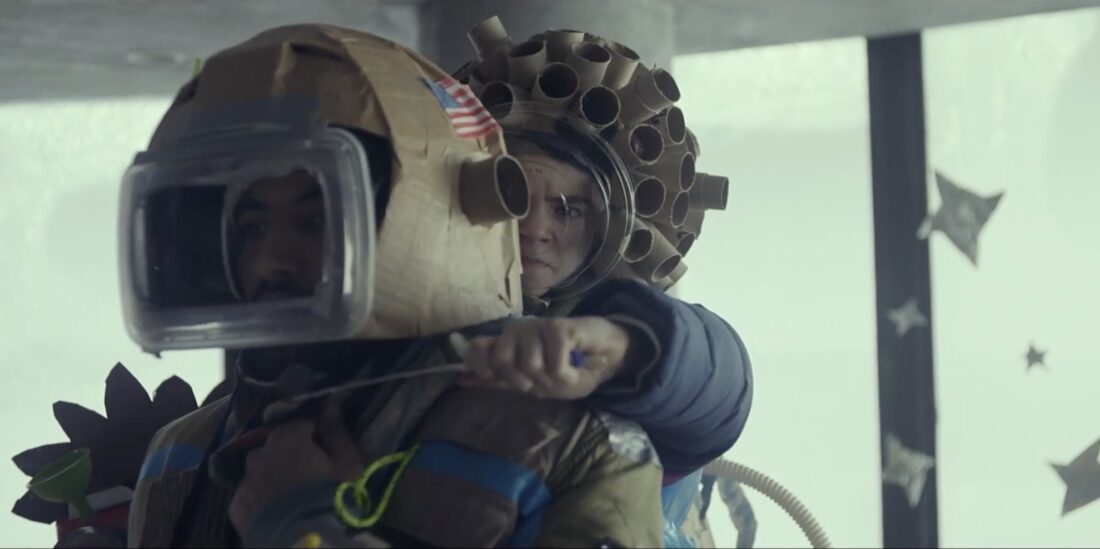
But a way to split that difference could be to do the “proper” adaptation with Marienbad, Olive Llewellyn’s pandemic novel from Sea of Tranquility, which is clearly a fictionalized version of Emily St. John Mandel’s pandemic novel Station Eleven. The thing is, we don’t actually know much about the content of the book itself, just how it affected its readers and how it turns Olive into a reluctant prophet even if she’s just writing about events that have come before and that will come after. We don’t even know what the title means! Though this review in The Brooklyn Rail draws a keen line to the 1961 French New Wave film Last Year at Marienbad, with its nonlinear storytelling between two people who either have or have not met before this moment.
In fact, Mandel joked via tweet about delivering her pitch for the plot and lead characters of Marienbad, which means that the first details we learn probably won’t be until we watch Sea of Tranquility—which feels like just the way it’s meant to happen.

